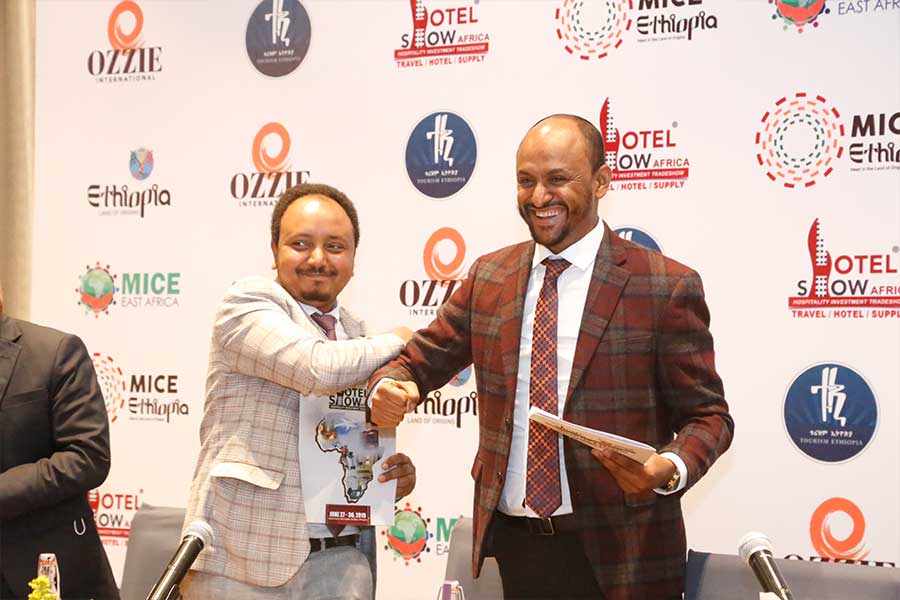
Viewpoints | Oct 16,2020
Filsan Abdullahi Ahmed (left), minister of Women, Children & Youth, elbow bumps President Sahle-Work Zewde before launching a continental networking platform for women entrepreneurs at the Skylight Hotel on March 18, 2021. The President officially launched the "50 Million African Women Speak" Ethiopian platform. She highlighted women's role in economic development and the importance of addressing structural barriers to an audience that included Abdul B. Kamara (PhD), deputy director-general at the African Development Bank Group (AfDB).
“[It'll] allow women entrepreneurs to access crucial information and networking opportunities for their business,” said Filsan, speaking during the event on the platform that was released as an app, "50MAWSP."
The platform is a networking site aimed at improving information exchanges between women entrepreneurs in member countries of the Common Market for Eastern & Southern Africa (COMESA), the East African Community (EAC) and the Economic Community of West African States (ECOWAS), with Ethiopia being a member of the first. The platform, launched in 2019 with a 12.4-million-dollar grant from the AfDB and currently present in 38 countries, is expected to help women obtain guidance on matters such as business registration and management.
Ethiopia finds itself close to the bottom in rankings measuring women’s economic empowerment, including the Women’s Economic Opportunity Index by The Economist. Women's economic outcomes in rural areas are further complicated by a lack of infrastructure, health centres and schools. They also face more limited access to credit and the market compared to men, according to USAID.
Several organisations operate programmes in the country to work with the government to address gender inequality, including the World Bank’s Women Entrepreneurship Development Project, which provides training and credit to micro and small enterprises owned or partly-owned by female entrepreneurs in several of the country's cities.
In its 10-year plan, the government aims to close the gender gap in employment by 2030 and raise beneficiaries from micro and small enterprises to half of the overall amount by the end of this decade.
PUBLISHED ON
Mar 20,2021 [ VOL
21 , NO
1090]

Viewpoints | Oct 16,2020

Commentaries | Oct 31,2020

Commentaries | Aug 10,2019

Radar | Aug 14,2021

Viewpoints | May 07,2022

Viewpoints | May 07,2022

My Opinion | Nov 25,2019

Fortune News | Nov 11,2023

Commentaries | Jan 27,2024

Radar | Aug 10,2019

Feb 24 , 2024 . By MUNIR SHEMSU
Abel Yeshitila, a real estate developer with a 12-year track record, finds himself unable to sell homes in his latest venture. Despite slash...

Feb 10 , 2024 . By MUNIR SHEMSU
In his last week's address to Parliament, Prime Minister Abiy Ahmed (PhD) painted a picture of an economy...

Jan 7 , 2024
In the realm of international finance and diplomacy, few cities hold the distinction that Addis Abeba doe...

Sep 30 , 2023 . By AKSAH ITALO
On a chilly morning outside Ke'Geberew Market, Yeshi Chane, a 35-year-old mother cradling her seven-month-old baby, stands amidst the throng...

Apr 20 , 2024
In a departure from its traditionally opaque practices, the National Bank of Ethiopia...

Apr 13 , 2024
In the hushed corridors of the legislative house on Lorenzo Te'azaz Road (Arat Kilo)...

Apr 6 , 2024
In a rather unsettling turn of events, the state-owned Commercial Bank of Ethiopia (C...

Mar 30 , 2024
Ethiopian authorities find themselves at a crossroads in the shadow of a global econo...